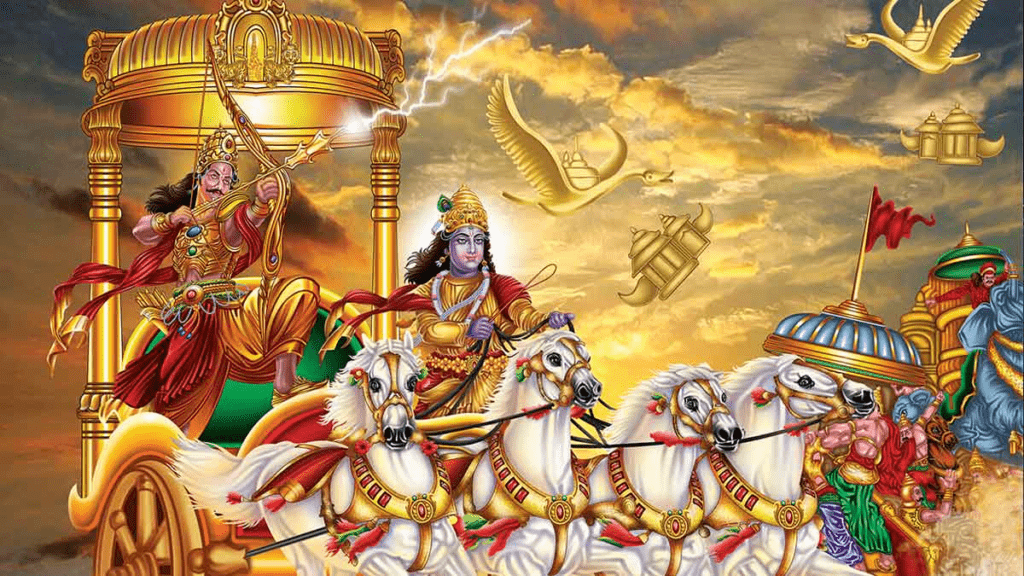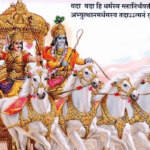Introduction:
The Bhagavad Gita, a sacred Hindu scripture revered for its profound wisdom, is a 700-verse philosophical text that forms part of the epic Mahabharata. Chapter 1 of the Bhagavad Gita serves as an awe-inspiring prelude to the philosophical discourse that follows. In this article, we’ll explore the essence of Chapter 1, summarizing its key aspects, and infusing the wisdom of some famous Sanskrit mantras from this chapter.
Chapter 1 Summary:
As the battlefield of Kurukshetra reverberates with the sound of conch shells and the anticipation of a monumental war, the stage is set for the epic clash between two powerful factions. The field is a vast expanse teeming with warriors, chariots, and elephants, but it is also a moment of profound turmoil and moral crisis for the mighty warrior Arjuna.
In the court of Hastinapura, King Dhritarashtra, who is blind and unable to witness the events himself, anxiously inquires about the happenings on the battlefield. Sanjaya, his loyal charioteer and narrator, is granted divine vision, enabling him to vividly describe the events to the king.
Arjuna, standing as a valiant prince of the Pandavas, the righteous faction, commands Lord Krishna, his charioteer, to place their chariot between the two armies. This strategic positioning affords Arjuna a clear view of the warriors assembled on both sides. Yet, what he beholds is not just a battleground but a heart-wrenching tableau.
What unfolds in Arjuna’s heart is a moral and emotional tempest of unparalleled proportions. He gazes upon his own kinsmen, beloved friends, revered teachers, and noble warriors arrayed on both sides of the battlefield, ready to engage in a brutal war. The sight of his own blood relatives, teachers, and companions as adversaries shatters him to the core.
Arjuna confronts an agonizing dilemma, a crucible of emotions and ethics. On one hand, he is bound by his dharma, his duty as a warrior, to fight for righteousness and justice. On the other hand, he is torn apart by his profound affection and empathy for his own people. He questions the morality of the war and the righteousness of killing those he loves. His mind is clouded by doubt and despair.
In this moment of inner turmoil and existential crisis, Arjuna lays down his bow and arrows, refusing to engage in the battle. His physical and mental strength wane, and he confesses to Lord Krishna his inability to bear the weight of the moment. Arjuna is overwhelmed by grief, and his spirit is broken.
In his profound vulnerability, Arjuna turns to Lord Krishna, who is not just his charioteer but the Supreme Being Himself. He seeks guidance and counsel from Krishna, who possesses divine wisdom and insight into the intricacies of life and duty.
Key Aspects of Chapter 1:
- The Battlefield of Kurukshetra: Chapter 1 vividly portrays the grandeur and gravity of the Kurukshetra war, showcasing the vast armies, war elephants, and heroic warriors assembled on both sides.
- Arjuna’s Moral Crisis: Arjuna, a revered warrior, undergoes a moral and emotional crisis when confronted with the prospect of fighting against his own relatives and friends. His inner conflict forms the central theme of this chapter.
- The Role of Sanjaya: Sanjaya, the charioteer and narrator, is blessed with divine vision by the sage Vyasa to describe the events on the battlefield to the blind King Dhritarashtra.
- The Significance of Lord Krishna: Lord Krishna, who serves as Arjuna’s charioteer, emerges as the central figure in the Bhagavad Gita. His role as the divine charioteer and spiritual guide becomes evident as the story unfolds.
- Arjuna’s Surrender: Arjuna’s emotional breakdown leads him to surrender to Lord Krishna, seeking his guidance and support to overcome his inner turmoil.
Incorporating Sanskrit Mantras:
Chapter 1 of the Bhagavad Gita is adorned with some profound Sanskrit mantras that encapsulate the essence of Arjuna’s moral dilemma and the divine wisdom imparted by Lord Krishna. These mantras serve as guiding lights amidst the darkness of Arjuna’s inner turmoil. Here are a few notable mantras from Chapter 1:
- “धृतराष्ट्र उवाच | धर्मक्षेत्रे कुरुक्षेत्रे समवेता युयुत्सवः | मामकाः पाण्डवाश्चैव किमकुर्वत सञ्जय || 1.1 ||”
Translation: “Dhritarashtra said: O Sanjaya, assembled in the holy land of Kurukshetra and desiring battle, what did my sons and the sons of Pandu do?”
This mantra marks the opening of Chapter 1, where King Dhritarashtra seeks to know the events unfolding on the battlefield.
- “तत्र शूर्य विशेषो योद्धु: कश्यचित् पर्यपाक्रमत | शङ्गे च मृगङ्गाणां च युध्यमानां महारथः || 1.2 ||”
Translation: “There, in the midst of the battlefield, a heroic, mighty archer named Duryodhana, who was a great chariot-warrior, sounded his conch shell.”
This mantra signifies the commencement of the war and introduces Duryodhana, one of the central characters of the epic conflict.
- “तत्र पण्डिताः शौर्य-शूर्य-दक्षिणायुद्ध-विशारदाः | युयुधू विराटश्च द्रुपदश्च महारथः || 1.4 ||”
Translation: “There in the Pandava army, Arjuna, who was skilled in warfare, along with Dhrishtadyumna, the mighty chariot-warrior, Virata, and Drupada, who was a great chariot-warrior, fought.”
This mantra highlights the Pandava side, emphasizing the prowess of their warriors, including Arjuna.
- “अथ व्यवस्थितान् दृष्ट्वा धार्तराष्ट्रान् कपिध्वजः | प्रवृत्ते शस्त्र-संपाते दहन्ति च आत्मयोनयः || 1.20 ||”
Translation: “Seeing the Kauravas arrayed and the fighting about to begin, Arjuna, whose banner bore the flag of Hanuman, took up his bow and prepared to shoot his arrows.”
This mantra is significant as it marks the moment when Arjuna prepares for battle, holding his bow Gandiva with determination.
Conclusion:
Chapter 1 of the Bhagavad Gita serves as an awe-inspiring prelude to the timeless wisdom and spiritual discourse that follows. It sets the stage for Arjuna’s moral crisis and his eventual surrender to Lord Krishna, paving the way for the teachings of the Gita on duty, righteousness, and the path to spiritual enlightenment.
Amidst the turmoil, the Sanskrit mantras in this chapter provide glimpses of the profound philosophies and dilemmas faced by the characters, underscoring the eternal lessons and guidance that the Bhagavad Gita imparts to humanity. As we journey through the subsequent chapters, we’ll delve deeper into the spiritual and philosophical treasures encapsulated within this ancient scripture.


